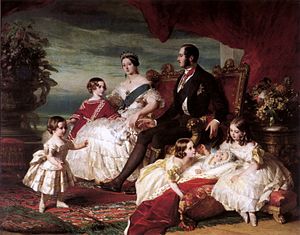
Back أخلاق فيكتورية Arabic Moral victoriana Catalan Viktorina moralo Esperanto Moral victoriana Spanish Moralité victorienne French Moralitas Victorian ID Moralità vittoriana Italian വിക്ടോറിയൻ സദാചാരം Malayalam Moral vitoriana Portuguese Викторианская мораль Russian

Victorian morality is a distillation of the moral views of the middle class in 19th-century Britain, the Victorian era.
Victorian values emerged in all social classes and reached all facets of Victorian living. The values of the period—which can be classed as religion, morality, Evangelicalism, industrial work ethic, and personal improvement—took root in Victorian morality. Current plays and all literature—including old classics, like William Shakespeare's works—were cleansed of content considered to be inappropriate for children, or "bowdlerized".
Contemporary historians have generally come to regard the Victorian era as a time of many conflicts, such as the widespread cultivation of an outward appearance of dignity and restraint, together with serious debates about exactly how the new morality should be implemented. The international slave trade was abolished, and this ban was enforced by the Royal Navy. Slavery was ended in all the British colonies, child labour was ended in British factories, and a long debate ensued regarding whether prostitution should be totally abolished or tightly regulated. Homosexuality remained illegal.